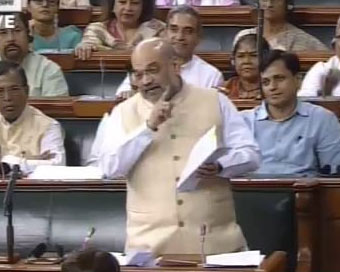 PM Modi visit USA
PM Modi visit USA Only the mirror in my washroom and phone gallery see the crazy me : Sara Khan
Only the mirror in my washroom and phone gallery see the crazy me : Sara Khan Karnataka rain fury: Photos of flooded streets, uprooted trees
Karnataka rain fury: Photos of flooded streets, uprooted trees Cannes 2022: Deepika Padukone stuns at the French Riviera in Sabyasachi outfit
Cannes 2022: Deepika Padukone stuns at the French Riviera in Sabyasachi outfit Ranbir Kapoor And Alia Bhatt's Wedding Pics - Sealed With A Kiss
Ranbir Kapoor And Alia Bhatt's Wedding Pics - Sealed With A Kiss Oscars 2022: Every Academy Award Winner
Oscars 2022: Every Academy Award Winner Shane Warne (1969-2022): Australian cricket legend's life in pictures
Shane Warne (1969-2022): Australian cricket legend's life in pictures Photos: What Russia's invasion of Ukraine looks like on the ground
Photos: What Russia's invasion of Ukraine looks like on the ground Lata Mangeshkar (1929-2022): A pictorial tribute to the 'Nightingale of India'
Lata Mangeshkar (1929-2022): A pictorial tribute to the 'Nightingale of India' PM Modi unveils 216-feet tall Statue of Equality in Hyderabad (PHOTOS)
PM Modi unveils 216-feet tall Statue of Equality in Hyderabad (PHOTOS)JSW Soorma Hockey Club are a step away from qualifying to the final of the Women’s Hocke
- Aus Open: Sinner survives early test to begin title defense
- Shiva Thapa, Sachin Siwach shine on Day 2 of men’s Boxing Nationals
- Freya Deshmane wins gold in first Winter Horse Show organised by Amateur Riders’ Club
- Salah sets Premier League record in Liverpool's draw at Newcastle
- India Open Competition in Shotgun begins in Jaipur, paving way for Nationals' qualification
Bill to designate individuals as terrorists passed in LS Last Updated : 24 Jul 2019 04:54:07 PM IST 
Home Minister Amit Shah A Bill to tighten the lead anti-terrorist law to empower the government to designate individuals as terrorists and streamline the process of confiscating their property, among other things, was passed in the Lok Sabha on Wednesday with voice vote despite the opposition's demand for its scrutiny by a Standing Committee.
The Unlawful Activities (Prevention) Amendment Bill, 2019, which seeks amendments to the Unlawful Activities (Prevention) Act, 1967, was passed with 278 members voting in favour and eight against.
The Bill got the Lok Sabha's nod minutes after Home Minister Amit Shah put up a strong defence of the government's proposals, arguing that terrorists such as Indian Mujahideen's Yasin Bhatkal, who were under the radar for years, would have been caught much earlier if he had been designated a terrorist.
Concluding the debate, Shah promised that the Modi government would never misuse its provisions.
Congress and several opposition parties staged a walkout after the Minister's reply demanding that the Bill be sent to a Standing Committee.
Shah said the BJP-led government had only brought an amendment to the law which was enacted by the Congress and whose provisions were later made stringent.
Responding to the arguments of other MPs, the Minister said what the Congress governments did "was right and what the BJP-led government is doing is also right".
"The law was enacted in 1967 by a Congress government and amendments made to it in 2004, 2008 and 2013 when Congress was in power. Who made the law stringent? What you did was right, what we we are doing is also right."
He asked opposition members about their concerns over powers of states when the Congress had made changes to the law.
"There is a need for tough laws to end terrorism," Shah said.
Referring to the provisions of the Bill that allow an individual to be designated a terrorist, Shah said a terrorist often floats new organisations if a ban is imposed on an existing one.
Minister of State for Home G. Kishan Reddy on Tuesday moved the Bill for passage in the House mentioning that the government wanted to take strict steps against terrorism for which it had adopted a "zero tolerance" policy.
Under the UAPA Act, the central government may designate a group a terrorist organisation if it commits or participates in acts of terrorism, prepares for terrorism, promotes terrorism or is otherwise involved in terrorism.
The Bill additionally empowers the government to designate individuals as terrorists on the same grounds.
As per the Act, an investigating officer is required to obtain the prior approval of the Director General of Police to seize properties that may be connected with terrorism.
The Bill adds that if the investigation is conducted by an officer of the National Investigation Agency (NIA), the approval of the Director General of NIA would be required for seizure of such property.
Under the Act, investigation of cases may be conducted by officers of the rank of Deputy Superintendent or Assistant Commissioner of Police or above. The Bill additionally empowers the officers of the NIA, of the rank of Inspector or above, to investigate cases.
The Act defines terrorist acts to include acts committed within the scope of any of the treaties listed in a schedule to the Act.
The Schedule lists nine treaties including the Convention for the Suppression of Terrorist Bombings (1997) and the Convention against Taking of Hostages (1979).
The Bill adds another treaty to the list: the International Convention for Suppression of Acts of Nuclear Terrorism (2005).IANS New Delhi For Latest Updates Please-
Join us on
Follow us on








172.31.16.186







